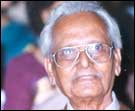Home > Movies > Features
The timeless tunes of Anil Biswas
Subhash K Jha |
May 31, 2003 23:10 IST
He passed away silently. Last seen on Zee TV's music contest Sa Re Ga Ma as a judge, legendary music director Anil Biswas had been leading a retired life for many decades now. His last compositions were heard in a film called Choti Choti Baatein in 1965. Since then the rare public appearance apart, the man's creativity had been put to sleep forever.
 Besides composing lilting melodies, Biswas's credits include introducing the legendary playback singer Mukesh. The song was the evergreen Dil jalta hai to jalne de in the film Pehli Nazar (1945). Another stalwart singer, ghazal king Talat Mahmood, got his first big break in the Biswas-composed score for Arzoo. Talat sang the ghazal Ae dil mujhe aisi jagah le chal.
Besides composing lilting melodies, Biswas's credits include introducing the legendary playback singer Mukesh. The song was the evergreen Dil jalta hai to jalne de in the film Pehli Nazar (1945). Another stalwart singer, ghazal king Talat Mahmood, got his first big break in the Biswas-composed score for Arzoo. Talat sang the ghazal Ae dil mujhe aisi jagah le chal.
Living legend Lata Mangeshkar also got one of her first major breaks from Anil Biswas. She fondly recalls her association with this gifted composer. "One of my first hits was Anilda's Mere liye woh gham-e-intezaar chod chale in 1948 for the film Anokha Pyar.
"There is a very interesting story about the songs of Anokha Pyar. While Anilda's wife and singer Meena Kapoor sang the songs in the film, all the numbers on the album were recorded in my voice. It was Anilda who introduced me to Raj Kapoor. One day, I was recording a song at Mahalaxmi Studios for Anilda when Raj Kapoor walked in. He wanted to hear me sing so he could use my voice for the film Aag."
Born in 1914 in Barisal, now in Bangladesh, Anil Biswas composed music for dozens of Bengali and Hindi films. In his childhood he learnt to play the tabla. He was an efficient child actor too.
A ferocious political activist in the 1930s, Biswas was repeatedly jailed. He scored the music for several Bengali films before moving to Mumbai (then Bombay) in 1934 where he was employed in several independent studios, including the famous Bombay Talkies of Himashu Rai.
Biswas's major scores include Mehboob Khan's Roti, K A Abbas's Munna, and Gyan Mukherjee's superhit Kismet (1943), which featured the all-time hit Aaj Himalay ki choti.
Though never a front-ranker, for a long period in the 1940s and 1950s, Biswas occupied a special place in music direction. His substantial erudition combined with his grasp over the grammar of film composition made his tunes eminently durable and timeless.